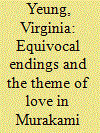| Srl | Item |
| 1 |
ID:
124532


|
|
|
|
|
| Publication |
2013.
|
| Summary/Abstract |
This article provides a close reading of three of Murakami Haruki's most representative love stories: Norwegian Wood, South of the Border, West of the Sun, and Sputnik Sweetheart. It aims to explore the representation of love in these novels through investigating their equivocal or inconclusive endings. I argue that equivocality is incorporated into these memoir-style works of fiction by analysing narrative features of the final scene. Norwegian Wood is narrated in such a way that the centre of orientation gradually shifts from the 'narrating self' to the 'narrated self', a shift that reduces the distance between narrator and reader and adds indeterminacy to the ending. The last episode of Sputnik Sweetheart is temporally destabilised by a shift to simultaneous narration, making the scene appear imaginary or unreal. In South of the Border, West of the Sun, the plot arrangement allows for multi-interpretation. I argue that Murakami, in all these stories, has purposefully adopted these devices to avoid determinacy or definiteness, and such inconclusiveness complements and reflects his concept of love.
|
|
|
|
|
|
|
|
|
|
|
|
|
|
|
|
| 2 |
ID:
150577


|
|
|
|
|
| Summary/Abstract |
In this article I aim to contribute to the discussion of Murakami Haruki’s significant role as a cultural mediator by examining his role as a translator with a focus on his attempts to explore cross-cultural effects. The discussion includes Murakami’s use of translation to experiment with language and to create his own writing style, his attitude towards his own translators, and the impact of his translation activity on his fiction writing.
|
|
|
|
|
|
|
|
|
|
|
|
|
|
|
|
| 3 |
ID:
092221


|
|
|
|
|
| Publication |
2009.
|
| Summary/Abstract |
This essay proposes a critical reading of After Dark by Murakami Haruki, published in 2004. I primarily focus on the ways in which this text attributes safety and danger, home and risk, or the quotidian and the extraordinary. I argue that the narrative style that Murakami employs here evokes in readers a longing for being safe at home and a sense of being content with the way things are. It presents the nature of space as heterogeneous, hence with a potential danger constantly lurking over it. Women are placed at the heart of such a heterotopic enclosure, projecting the clich d desire of the male gaze, which is represented by the voice of the narrator. Jean-Luc Godard's 1965 film Alphaville is one of the key references Murakami makes in this text. In this film misogyny and self-reference are strategically employed to perform a critique of history. Reading After Dark in the light of Alphaville, I question the value of Murakami's narrative strategy.
|
|
|
|
|
|
|
|
|
|
|
|
|
|
|
|